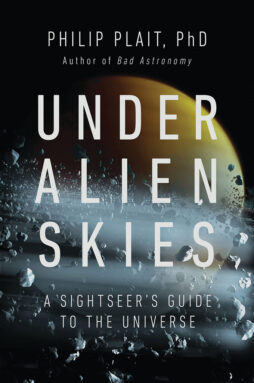‘Under Alien Skies’ imagines what the sky looks like on other planets
Under Alien Skies
Philip Plait
W.W. Norton & Co., $30
Why is the sky blue? I remember asking my parents that question as a kid. When the sun’s rays hit the blanket of air that encircles the Earth, they told me, blue light scatters more than other colors. Despite my fascination with the cosmos, I never thought to ask what the sky would look like on other worlds.
Luckily, astronomer and science writer Philip Plait has. His new book, Under Alien Skies, is a bewitching cosmic ride through the solar system and beyond, transporting readers aboard futuristic starships to discover what the sky might look like above faraway landscapes.
Plait is the perfect captain on this expedition, vividly bringing these alien worlds to life while deftly weaving in the science to support the scenery. He even includes explanations of the space suits you’d need to stand and gaze at the skies on the moon, Mars, Pluto and other orbs.
In some cases, it’s not too hard to imagine the views. Thanks to rovers, we’ve seen actual images of Mars’ sky (SN: 8/13/22, p. 20). It’s typically the color of rust, because the Red Planet’s atmosphere is chock-full of dust that tends to scatter red light the most. Pluto’s sky is vastly different. It’s so far away from the sun that, even at midday, the sky is utterly black and the stars are visible.
Contrary to what some articles on the internet say, the sun would not look like any other star in the sky. Standing on Pluto, the sun would appear one-fiftieth its size from Earth’s viewpoint. But it would blaze as a “painfully bright” dot, Plait writes, about 160 times as bright as the moon looks to us, and it would have a faint, deep-blue halo because Pluto’s thin air scatters short, blue wavelengths of light.
One of my favorite stops on Plait’s tour is the comet 67P/Churyumov–Gerasimenko, a two-lobed object shaped like a big rubber ducky. He lands readers on the larger lobe. Looking up toward the sky means seeing the rocks of the smaller lobe. “ ‘Smaller’ seems like the wrong word; it looks like an entire planet hanging over your head,” Plait writes.
Jetting to the smaller lobe, Plait points out a metal pole jutting from the rocks. The pole is attached to a box, turned off-kilter. It’s Philae, the lander that bounced and crashed on the comet in 2014 (SN: 8/22/15, p. 13). “Oh Philae,” Plait writes. “It’s so good to see you.” Finding Philae and exploring the aftermath of its crash would show just how fragile the comet is, Plait explains. The lander shattered the rocks it hit on impact, even though it was moving slower than a typical walking speed. The loose rock and ice would appear as wispy as piles of pixie dust.
The book ends with an aptly named final chapter, “The last sky you’ll ever see,” which contemplates the view from close to a black hole. Going inside a black hole is out of the question; you’d be toast. But from a safe distance, a starship can get a good peek with some telescopes — good enough that it feels like you’re hovering just above the event horizon, the black hole’s point of no return (SN: 5/31/14, p. 16).
Sitting there, you see … nothing. “No, that’s not fair,” Plait writes. After the long journey and the suspense of experiencing such a beast, you’d feel cheated if you saw seemingly empty space. Take a closer look, he says. If you squint, you can make out the rim around the black hole, where stars jostle, and then one slides along the curve of the horizon until its light flickers into that nothingness. You have a front-row seat to see the star’s light being bent by the black hole’s gravity. “It’s mesmerizing, if a bit disconcerting,” Plait writes.
If you could zoom in all the way to the center of the black hole, you’d see even weirder stuff. Exactly what, I won’t reveal; I’ll let you read the book and find out. I highly recommend you do.
Buy Under Alien Skies from Bookshop.org. Science News is a Bookshop.org affiliate and will earn a commission on purchases made from links in this article.
For all the latest Technology News Click Here
For the latest news and updates, follow us on Google News.

